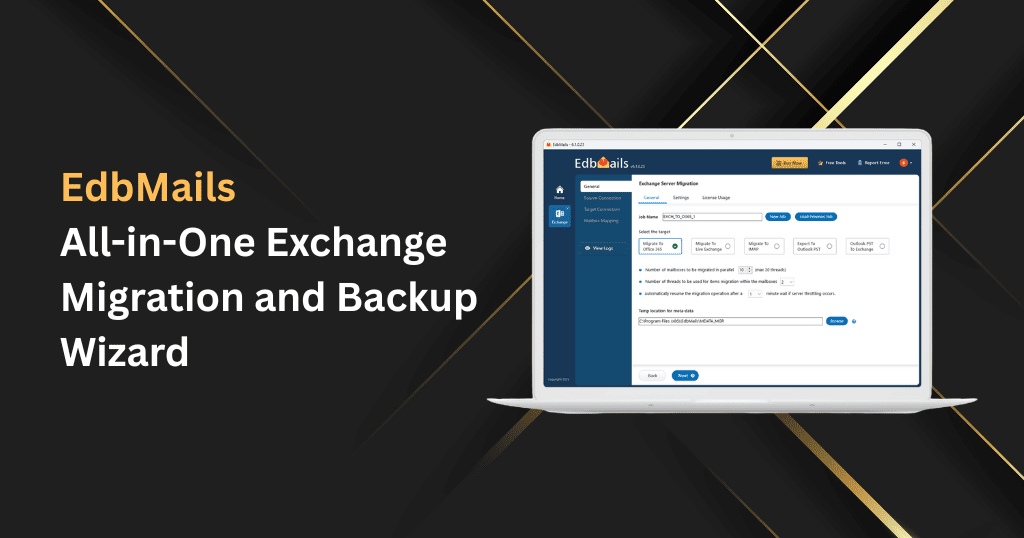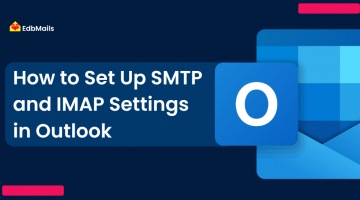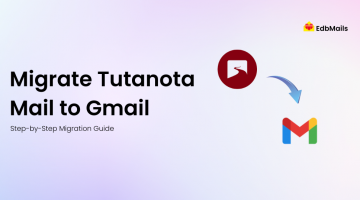For organizations running Microsoft Exchange Server, data security, uptime, and seamless communication are the backbone of daily business operations. Over time, however, IT administrators face the inevitable challenges of server upgrades, mailbox migrations, regulatory compliance, and data protection. For example, companies still on Exchange 2010 or 2013 must now move forward since Microsoft has ended mainstream support for these versions. Similarly, many enterprises are embracing Office 365 (Microsoft 365) for its scalability and cloud capabilities.
The challenge? Manual migration using Microsoft’s native tools can be overwhelming. PowerShell scripting, hybrid configuration, and coexistence setups demand advanced expertise, and even then, the risk of downtime or data loss is significant. Backups, too, are difficult to automate reliably, especially for large environments.

EdbMails offers dedicated software solutions for Exchange Migration and for Exchange Server Backup & Restore. These purpose-built tools are designed to simplify complex IT tasks such as upgrading servers, migrating to Office 365, exporting mailboxes to PST, or securing data with reliable backups. With features like zero downtime, AES 256-bit encryption, OAuth 2.0 modern authentication, and compliance with GDPR, HIPAA, and ISO 27001, EdbMails ensures that organizations can manage migrations and backups with efficiency, flexibility, and complete data security. Whether you’re modernizing your Exchange infrastructure or safeguarding critical business communications, EdbMails provides everything IT teams need in one streamlined solution.
Exchange Server to Exchange Server Migration
Migrating from one Exchange server to another can be daunting, particularly when upgrading across multiple versions. EdbMails removes this complexity by providing a direct, secure, and fully automated migration process.
With support for Exchange 2007, 2010, 2013, 2016, and 2019, administrators can upgrade directly without intermediate hops. For example, businesses still using Exchange 2010 can move straight to Exchange 2019 instead of first upgrading to 2013 or 2016, which saves significant time and reduces risk. This is especially important since Exchange 2013 reached the end of support.
EdbMails also supports cross-forest and cross-domain migrations, making it ideal for organizations undergoing mergers, acquisitions, or IT restructuring. Using a CSV-based batch migration, admins can map hundreds of mailboxes in one go, ensuring large-scale transitions remain efficient. Importantly, users continue to access their emails during the migration, ensuring business continuity and zero disruption.
👉 Learn More: Exchange to Exchange Migration Guide
Exchange Server to Office 365 Migration
The shift to cloud-based productivity platforms is accelerating, and many businesses are choosing Office 365 (Microsoft 365) for its scalability, collaboration tools, and reduced infrastructure costs. EdbMails provides a direct, secure migration path from Exchange to Office 365 without the headaches of manual methods.
Native migrations often require setting up a hybrid environment or uploading PST files through the Office 365 Import Service, which is limited by a 10GB file size restriction and prone to errors. In contrast, EdbMails performs direct mailbox migration from Exchange to Office 365, eliminating the need for staging servers, hybrid setups, or manual uploads.
Other advanced features include OAuth 2.0 modern authentication, which enhances security with MFA support, granular mailbox selection, and incremental migration, which ensures only new or modified items are migrated in subsequent runs. Public folders, shared mailboxes, and archive mailboxes are fully supported, making EdbMails an all-in-one solution for organizations moving to the cloud.
👉 Learn More: Exchange to Office 365 Migration Guide
Exchange Server to PST Export
Exporting mailboxes to PST remains a common need for archival, compliance, litigation, or migration purposes. While Microsoft’s built-in tools allow basic exports, they can be complex, unreliable for large mailboxes, and time-consuming.
EdbMails streamlines the process by enabling direct export of Exchange mailboxes to PST files with no file size limitations. This means administrators can securely export very large mailboxes that would otherwise be restricted by Outlook’s limits. Additionally, EdbMails preserves the complete folder hierarchy, metadata, and attachments, ensuring that PST files remain consistent and usable for future restores or audits.
Administrators can export entire mailboxes, selected folders, or specific user accounts depending on business requirements. These PST files can then be imported into Outlook, archived for compliance, or used as a source for migrations. With its simplicity and reliability, EdbMails eliminates the common pain points associated with native PST export tools.
👉 Learn More: Exchange to PST Export Guide
Exchange Backup and Restore
A reliable backup strategy is essential for any business to safeguard against accidental deletions, system failures, or ransomware attacks. EdbMails’ Exchange Backup and Restore Tool offers an enterprise-grade solution designed specifically for Exchange environments.
The backup process is both flexible and secure. The first backup captures the full mailbox data, and subsequent backups are incremental, meaning only new or modified items are saved. This saves bandwidth, storage space, and reduces backup time significantly. Administrators can choose to back up entire mailboxes, selected folders, or individual user accounts, depending on business needs.
EdbMails employs AES 256-bit encryption to protect backup data and ensures that users experience zero downtime during the process. Even if network interruptions occur, the software automatically reconnects and resumes without errors. Restoration is equally straightforward — you can restore backups to the same Exchange server, a different server, or even Office 365, providing complete flexibility.
👉 Learn More: Exchange Server Backup Guide
👉 Learn More: Steps to restore Exchange server Data
Security and Compliance
Data security is a top concern for organizations during migrations and backups. EdbMails addresses this with a multi-layered security framework designed to protect sensitive data at every stage.
The software leverages OAuth 2.0 modern authentication for secure login, fully supporting multi-factor authentication (MFA). All data transfers are protected with AES 256-bit end-to-end encryption, ensuring that emails, attachments, and other items cannot be intercepted or compromised during migration or backup.
EdbMails also complies with major international standards, including GDPR, HIPAA, and ISO 27001, making it suitable for industries with strict regulatory requirements. In addition, administrators can generate detailed audit logs to track every action for governance, reporting, and compliance audits.
👉 Learn More: Exchange Migration Security
Why Choose EdbMails over Native Tools
Microsoft’s native tools may appear cost-effective, but they often create hidden challenges such as extended downtime, technical complexity, and lack of automation.
EdbMails bridges these gaps by offering a simple, wizard-driven interface that requires no scripting or hybrid setup. Unlike the 10GB PST limitations imposed by Microsoft, EdbMails imposes no file size restrictions, making it ideal for large-scale enterprises. Its incremental migration and backup features also save bandwidth and time, ensuring that operations run smoothly without data duplication.
Most importantly, EdbMails comes with 24/7 expert support, ensuring that organizations never face challenges alone — something native tools do not provide.
Supported Migration Scenarios
EdbMails supports a wide range of migration paths, making it flexible enough for virtually any IT environment. Supported scenarios include:
- Exchange 2010 to Exchange 2019
- Exchange 2010 to Office 365
- Exchange 2013 to Office 365
- Exchange 2013 to Exchange 2019
- Exchange 2016 to Exchange 2019
- Exchange 2016 to Office 365
- Hosted Exchange to Office 365
- Exchange 2019 to Office 365
- Cross-forest and cross-domain Exchange migrations
This broad compatibility ensures that businesses can adopt the latest technology without being locked into outdated systems or complex intermediate upgrades.
Business Benefits of Choosing EdbMails
The ultimate value of EdbMails lies in its ability to help businesses save time, reduce costs, and minimize risk. By automating processes that would otherwise require days of manual effort, IT teams can focus on higher-value tasks.
- Cost Savings : Avoid expensive consultants and minimize downtime costs.
- Operational Efficiency : Automated incremental sync and reconnection reduce administrative burden.
- Future-Ready : Supports the latest Exchange and Office 365 environments.
- Peace of Mind : Enterprise-grade security ensures your data is always protected.
These advantages make EdbMails a strategic choice for organizations looking to modernize their Exchange environment without sacrificing security or productivity.
Dedicated Support and Assistance
Even with the most reliable software, migrations and backups can raise technical questions. That’s why EdbMails offers round-the-clock expert support to guide IT administrators every step of the way.
From planning consultations to real-time troubleshooting, EdbMails ensures that every customer has access to expert help whenever needed. This personalized support dramatically reduces risks, accelerates project timelines, and gives businesses confidence that their migration or backup project will succeed.
Conclusion
Whether your organization needs to upgrade from Exchange 2010 to 2019, migrate to Office 365, export mailboxes to PST, or implement secure backups, EdbMails provides dedicated solutions tailored to each task.
With zero downtime, automated processes, enterprise-grade security, and full compliance with international standards, EdbMails helps businesses transition seamlessly while protecting their most critical communication data. Backed by 24/7 expert support, EdbMails ensures your migration and backup projects are faster, safer, and more cost-effective than traditional methods.



